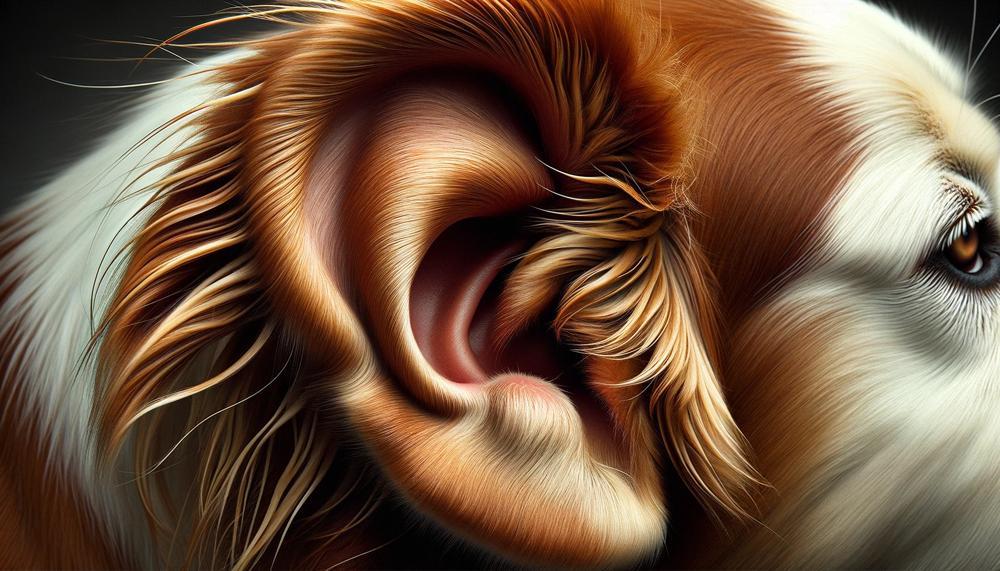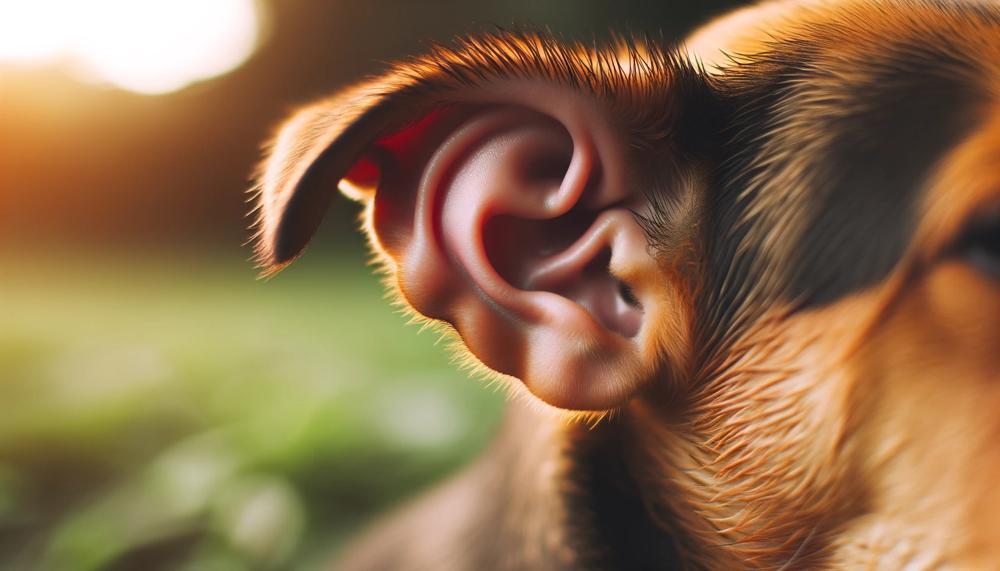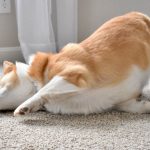As a dog owner, you may have noticed your beloved canine companion nibbling on your ears from time to time. While it may seem like a strange and even comical behavior, there are actually several reasons why dogs engage in this action. In this blog post, we’ll take a closer look at the fascinating reasons behind why dogs nibble their owners’ ears and what it means for their relationship with us.
From natural grooming instincts to signs of affection and bonding, there’s more to this behavior than meets the eye. So, why does my dog nibble my ears?
Dogs may nibble on your ears for many reasons, including:
- Comfort: A dog may nibble on your ears to show that they are comfortable with you, accept you as part of their pack, and love you. Mutual grooming is common among pack members, and you may be perceived as just one of the pack.
- Attention: A dog may nibble on your ear vigorously to indicate that they want your attention for something.
- Boredom: Dogs are social animals that can get bored easily. They may chew on things to relieve boredom, including your sofa stuffing, your carpet, and your legs.
- Teething: A puppy’s behavior may be related to your pet’s age and what’s currently happening in their mouths and brains. Puppies explore the world with their mouths, and biting is a normal part of their development.
- Playfulness: A dog may nibble your ears because they’re being playful.
- Grooming: A dog may nibble on your ears when they’re attempting to groom you.
- Taste: A dog may nibble on your ears because they simply love the taste.
- Allergies: Itching and pawing at the ears may be due to allergies. Allergies may be caused by just about anything, foods, dusts, pollens, chemicals, etc..
Key takeaways
Table of Contents
- 1 Key takeaways
- 2 3 Reasons Why Your Dog Nibbles Your Ear
- 3 Why Does My Dog Nibble Me Gently?
- 4 Why Does My Dog Nibble My Neck?
- 5 Why Does My Dog Nibble Me With Front Teeth?
- 6 Steps to Take When Your Dog Nibbles Your Ears
- 7 Getting Professional Help if Necessary
- 8 Should You Allow Your Dog to Nibble Your Ear?
- 9 Conclusion
To address this behavior effectively, it is crucial to provide sufficient attention, socialization, mental and physical stimulation, and address any potential health problems.
Setting boundaries and redirecting the behavior with appropriate chew toys can also be beneficial. It is essential to differentiate between gentle nibbling and biting to avoid any potential discomfort or harm.
Key takeaways:
- Dogs may nibble on their owner’s ears for attention, affection, teething, socialization, boredom, or health issues.
- Providing ample attention, socialization, and stimulation can help address this behavior.
- Setting boundaries and redirecting the behavior with suitable chew toys can also be helpful.
3 Reasons Why Your Dog Nibbles Your Ear
| Love and Connection | Dogs may gently nibble on their owner’s ears as a way to express love and form a bond, similar to how wolves groom each other in a pack. This behavior is instinctual and helps strengthen the relationship between dogs and their human companions. |
| Seeking Attention | Nibbling on ears can also be a sign of attention-seeking behavior in dogs. They may learn that this action will elicit a response or attention from their owners, leading them to continue the behavior. |
| Playful Curiosity | Another reason why dogs may nibble on their owner’s ears is out of playfulness or curiosity. Dogs use their mouths to explore their surroundings and nibbling on ears can provide sensory information. This behavior is also seen as an extension of playful behavior in dogs. |
In conclusion, dog ear nibbling is typically harmless and can strengthen the bond between dogs and their owners. However, it’s important to set boundaries and discourage excessive nibbling.
If you have a compromised immune system or an ear infection, it’s best to avoid having your ears licked or nibbled by dogs. It’s also vital to differentiate between gentle nibbling (cobbing) and more aggressive behaviors like biting, which can cause discomfort or injury.
By understanding the reasons behind this behavior, dog owners can better manage and foster a strong and healthy relationship with their beloved furry friends.
Love and Connection:
Dogs are affectionate animals, and they often show their love through physical actions such as licking, tail wagging, and yes, nibbling. Ear nibbling is a form of grooming and bonding that dates back to the time when dogs were wild wolves.
Wolves would groom each other as a way of bonding and showing love within the pack.
This behavior has been passed down to domesticated dogs, and it remains an important way for them to connect with their human pack members.
Seeking Attention:
Dogs are smart creatures, and they quickly learn what actions will get them attention from their owners. Some dogs may nibble on their owner’s ears to get a response or attention. This can be especially true if the dog feels neglected or wants to play.
By nibbling on ears, they can elicit a reaction from their owners, which reinforces this behavior.
Why Does My Dog Nibble Me Gently?
Dogs gently nibble us to communicate and show affection. This behavior is ingrained in them from their mother during their puppy days. It’s a way for them to express love and seek attention from their owners.
However, this behavior can also hold other meanings.
| Reasons for dog nibbling | What it means | How to address |
| Communication and affection | Your dog is showing love and seeking attention. | Set boundaries and redirect the behavior when necessary. |
| Self-soothing | Dogs may nibble when feeling nervous or stressed. | Identify the root cause and provide alternative activities. |
| Puppies and young dogs | Nibbling is more common in younger dogs as they learn social behaviors. | Monitor and train for appropriate behaviors. |
| Obsessive or aggressive nibbling | If the behavior becomes excessive or aggressive, it may require professional intervention. | Seek help from a veterinarian or animal behaviorist. |
| Reward desired behavior | When your dog stops nibbling, reward with high-value treats to reinforce good behavior. | Use positive reinforcement to encourage appropriate actions. |
| Cute examples of nibbling | Dogs may nuzzle, nibble feet or blankets, and even show affection towards other animals like cats. | Enjoy these cute moments but also set boundaries when necessary. |
| Other interesting dog behaviors | Dogs may also exhibit zoomies, dreaming, chattering teeth, and digging. | Learn more about your dog’s behaviors to better understand and care for them. |
In conclusion, dogs demonstrate their love and affection through gentle nibbling. This behavior is picked up from their mother during their puppy days. Apart from showing love, nibbling can also be a way for dogs to self-soothe or seek attention.
As responsible dog owners, it’s crucial to set boundaries and redirect the behavior when necessary. Rewarding desired behavior with high-value treats can also reinforce good habits.
If the nibbling becomes excessive or aggressive, it may require professional intervention. Overall, nibbling is a natural and endearing behavior that strengthens the bond between dogs and their owners.
There are many interesting behaviors that dogs exhibit, such as zoomies, dreaming, chattering teeth, and digging.
Why Does My Dog Nibble My Neck?
This behavior is natural for dogs and is often learned from their mother during their puppyhood. However, it can also be a sign of underlying issues that require attention.
To address this behavior, it is crucial to determine the underlying cause. If the dog is nibbling out of affection or playfulness, redirecting their attention to a toy or game can help. Alternatively, ignoring the behavior can be effective in teaching them that this behavior is unacceptable.
If the nibbling is a form of grooming or communication, fulfilling the dog’s needs in these areas can help reduce the behavior. This could involve regular grooming sessions or providing more opportunities for socialization and communication with other dogs.
In cases where the nibbling is a means of stress relief, identifying triggers and addressing any underlying anxiety or stress can help decrease the behavior. This may include seeking assistance from a veterinarian or trainer to develop a plan for managing the dog’s stress levels.
It is essential to note that punishing the dog for this behavior is not recommended as it can escalate the behavior and damage the relationship between the dog and owner. If the nibbling behavior is excessive or accompanied by changes in behavior, consulting with a veterinarian is important to determine any underlying medical issues. Seeking help from a trainer or behaviorist may also be necessary if other methods are not effective.
Potential reasons for a dog to nibble on their owner’s neck:
| Expressing affection | Play initiation | Grooming |
| Communication | Seeking stress relief |
Effective ways to address this behavior:
| Redirecting attention to a toy or game | Ignoring the behavior | Fulfilling grooming and communication needs |
| Identifying and addressing stress triggers | Seeking assistance from a veterinarian or trainer if necessary |
Why Does My Dog Nibble Me With Front Teeth?
Dogs often use their front teeth to nibble, which can be a way to explore their surroundings, seek attention or affection, express excitement, or relieve stress and anxiety.
This behavior is completely natural and stems from their innate instincts and preferences. It may also be a way for young puppies to learn about the world around them before their back teeth come in.
However, if your dog persistently bites with excessive force, it could potentially signal underlying issues that need to be addressed through proper training and management. It is crucial to closely monitor interactions between children and dogs and educate them on how to handle and interact with dogs without overstimulating them.
Seeking professional guidance may be necessary if aggressive biting persists.
Steps to Take When Your Dog Nibbles Your Ears
When your canine companion starts nibbling on your ears, it can be frustrating and even painful. However, there are several steps you can take to train them to stop this behavior.
These steps include redirecting their behavior, understanding their needs and wants, using vocal cues, avoiding direct eye contact, training specific cues, seeking professional help, increasing exercise, and providing distractions.
Step 1: Redirect Behavior
Instead of scolding your dog for nibbling on your ears, try redirecting their attention to a more appropriate object.
Give them a chew toy or bone to focus their chewing behavior on, while also teaching them what is acceptable to chew on.
Step 2: Understand Their Needs and Wants
Dogs may nibble on ears as a way to communicate their needs or wants, such as food or the need to go outside.
In such cases, fulfilling these needs can help reduce the behavior. It is important to understand what your dog is trying to communicate with this behavior.
Step 3: Use Vocal Cues
When your dog starts nibbling on your ears, make a low-pitched ‘no’ sound and shake your head lightly to send a clear signal that this behavior is not welcome.
This vocal cue will help reinforce the message that ear nibbling is not acceptable.
Step 4: Avoid Direct Eye Contact
Direct eye contact can be interpreted by dogs as attention. Therefore, avoid looking directly into your dog’s eyes when they are nibbling on your ears.
This will help prevent reinforcing the behavior.
Step 5: Train Specific Cues
Teaching your dog specific cues such as “stop it” or “no” can help discourage ear nibbling. Rewarding them when they comply with these cues will reinforce good behavior.
Step 6: Seek Professional Help
If your dog’s ear nibbling is due to stress or anxiety, it may be helpful to consult an animal behaviorist for guidance on how to manage and train your dog. They can provide specific strategies tailored to your dog’s needs.
Step 7: Increase Exercise
Boredom can often lead to unwanted behaviors such as ear nibbling. Make sure your dog is getting enough physical exercise and mental stimulation to prevent them from seeking attention through this behavior.
Step 8: Provide Distractions
When your dog starts nibbling on your ears, offer them a toy or other activity to redirect their attention. This will help prevent them from repeating the behavior.
It is important to remember that training takes time and consistency. Be patient with your dog and continue using these steps to reinforce good behavior. Additionally, providing safe chew toys or bones for your dog to chew on can also help redirect their need to nibble.
Getting Professional Help if Necessary
Getting professional help from a dog trainer or behaviorist can prove invaluable in understanding and addressing your dog’s ear nibbling tendencies. These experts have vast experience and knowledge in handling dogs and can provide personalized advice and techniques to modify your dog’s behavior.
- Identify the root cause: A professional trainer or behaviorist can assist you in identifying the underlying reasons behind your dog’s ear nibbling behavior. They can observe your dog’s body language, analyze their interactions with you and other dogs, and determine any potential triggers or underlying issues that may be causing this behavior.
- Create a tailored training plan: Based on their assessment, a professional trainer or behaviorist can create a customized training plan specifically designed for your dog’s individual needs. This may include redirecting their behavior, using positive reinforcement techniques, and teaching specific cues to discourage ear nibbling.
- Provide expert guidance: A professional trainer or behaviorist can guide you through the training process and offer helpful tips and advice on how to effectively communicate with your dog. They can also offer support and guidance if you encounter any challenges during the training process.
- Address complex issues: In cases where a dog’s ear nibbling behavior is severe and requires specialized attention, a veterinary behaviorist who is board-certified may be recommended. These professionals have advanced training in animal behavior and are equipped to handle complex issues such as aggression or trauma.
- Promote positive reinforcement techniques: Professional trainers and behaviorists utilize positive reinforcement techniques to encourage positive behaviors in dogs. This involves rewarding desired behaviors, such as not nibbling on ears, rather than punishing unwanted behaviors.
- Access ongoing support: A professional trainer or behaviorist can provide ongoing support and guidance as you work through your dog’s ear nibbling behavior. This ensures long-term success and addresses any challenges that may arise.

Should You Allow Your Dog to Nibble Your Ear?
Allowing your dog to nibble on your ear can generally be considered safe. It’s a common behavior for dogs and can even serve as a way to show affection and strengthen the bond between you and your furry friend.
However, it’s crucial to establish boundaries and discourage excessive nibbling. Keep an eye out for any signs of discomfort or underlying issues that may be causing your dog to nibble on your ear.
Seeking help from a trained dog trainer or behaviorist can also be greatly beneficial in managing and understanding this behavior.
Conclusion
In conclusion, the seemingly odd behavior of dog ear nibbling is actually a complex and natural instinct that serves multiple purposes for our canine companions.
Whether it’s a way to show affection, groom themselves or others, seek attention, or simply play, understanding the reasons behind this behavior can deepen our bond with our furry friends.
By providing appropriate attention, socialization, and stimulation, as well as setting boundaries when necessary and seeking professional help if needed, we can effectively manage and nurture a healthy relationship with our beloved dogs.






